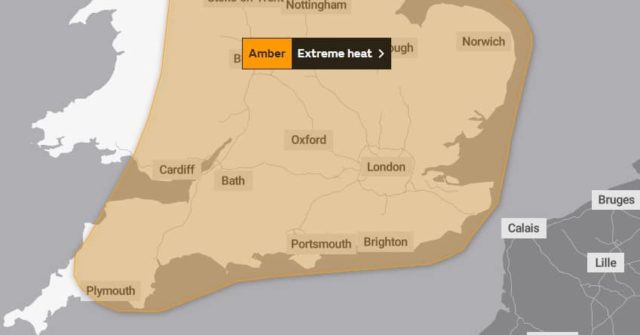The Isle of Wight council is warning that those with underlying, long-term health issues, particularly heart and lung conditions, need to be especially cautious as the heatwave continues and even higher temperatures are expected at the weekend and early next week.
The Met Office has issued an Amber Extreme heat warning with temperatures in excess of 35°C in the south-east forecast on Sunday (17th July) through to 9pm on Tuesday (19th July).
Love: Really important that we all heed the advice
Cllr Karl Love, Cabinet member for adult social care and public health, said severe heat was dangerous to everyone, but people with respiratory and cardiovascular diseases were particularly vulnerable.
He said,
“When temperatures remain abnormally high for a prolonged period of more than a few days, it can prove stressful and even fatal for some.
“That is why it is really important that we all heed the advice to help keep ourselves well and do all that we can to take care of young children, the elderly and those with a long-standing medical condition — even checking in on family who don’t live with you, friends and neighbours, if you can.
“Remember to slap on that sunscreen and wear hats and ensure you don’t spend too much time in the sun. Please use factor 30 and above and apply it regularly.”
Effect on medical conditions
Higher temperatures may exacerbate the effects of air pollution, which can make respiratory symptoms worse.
The effect of heat on the cardiovascular system can be a strain on the heart as large quantities of blood need to circulate to the skin to keep cool.
The additional pressure on the heart could be enough to precipitate a cardiac event.
More vulnerable to the effects of heat
People on medications that control the balance of the body’s natural salts and minerals, or medications to control cardiac (heart) function are also at risk, as sweating and dehydration will affect that balance and can inhibit the ability to sweat, thereby making a person more vulnerable to the effects of heat.
Young children’s susceptibility to high temperatures varies.
Keeping children hydrated
Children cannot control their body temperature as efficiently as adults during hot weather because they do not sweat as much and so can be at risk of ill-health from heat.
This can range from mild heat stress to more serious and potentially life-threatening heatstroke. The main risk from heat for children is dehydration.
Avoid getting hot in the first place
It is important for people to avoid getting hot in the first place and, if hot, to give the body a break from the heat by moving to a cooler part of the house, finding some shaded green space (it may be cooler outside in the shade than it is indoors), or by having a cool bath or shower.
Advice as the temperature rises, is to:
- stay out of the sun between 11am and 3pm;
- apply sunscreen, wear loose, lightweight cotton clothing, a hat, and sunglasses;
- have plenty of cold drinks – avoid alcohol, caffeine and hot drinks;
- avoid physical exertion including DIY or gardening as well as sport and exercise, but if it can’t be avoided try to keep to doing more vigorous exertion in the early morning or evening when it is cooler;
- children should not take part in vigorous physical activity on very hot days, such as when temperatures are above 30°C.
Stay cool
Keep your environment cool:
- Keep your bedroom and living space cool by closing the curtains on windows that receive the sun and opening your windows at cooler times of the day – in the early morning and overnight.
- Turn off non-essential lights and electrical items as these generate heat.
- Electric fans may provide some relief if temperatures are below 35 degrees C (but do not aim them directly at the body).
- Seek medical advice if you have a chronic long-term condition or are taking multiple medications and become unwell due to the heat.
- Keep medications that require storing below 25 degrees C in the fridge.
- Follow storage instructions on packaging.
For information on heat-related illnesses and what to do should you or someone you know feel unwell, visit the NHS Website.
Call NHS 111 or a GP if you or someone you know becomes unwell. Call 999 in an emergency.

News shared by Isle of Wight council press office, in their own words. Ed
Image: mediocre studio under CC BY 2.0





